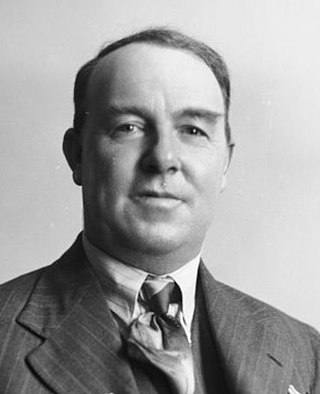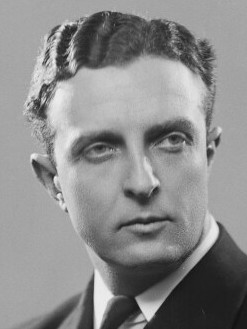Related Research Articles

The Metropolitan Borough of Greenwich was a metropolitan borough in the County of London between 1900 and 1965. It bordered the boroughs of Woolwich, Lewisham and Deptford and, across the River Thames, the borough of Poplar and the County Borough of West Ham in Essex. Within the area of the borough were the Royal Naval College, the Royal Observatory and Greenwich Park.

The 1935 United Kingdom general election was held on Thursday 14 November 1935. It resulted in a second landslide victory for the three-party National Government, which was led by Stanley Baldwin of the Conservative Party after the resignation of Ramsay MacDonald due to ill health earlier in the year. It is the most recent British general election to have seen any party or alliance of parties win a majority of the popular vote.
The National Labour Organisation, also known simply as National Labour, was formed in 1931 by supporters of the National Government in Britain who had come from the Labour Party. Its leaders were Ramsay MacDonald (1931–1937) and his son Malcolm MacDonald (1937–1945).

The 1929 United Kingdom general election was held on Thursday, 30 May 1929, and resulted in a hung parliament. Ramsay MacDonald's Labour Party won the most seats in the House of Commons for the first time despite receiving fewer votes than the Conservative Party, led by Prime Minister Stanley Baldwin. The Liberal Party, led again by former Prime Minister David Lloyd George, regained some of the ground lost in the 1924 general election and held the balance of power. Parliament was dissolved on 10 May.

The 1923 United Kingdom general election was held on Thursday 6 December 1923. The Conservatives, led by Prime Minister Stanley Baldwin, won the most seats, but Labour, led by Ramsay MacDonald, and H. H. Asquith's reunited Liberal Party gained enough seats to produce a hung parliament. It is the most recent UK general election in which a third party won over 100 seats and the most narrow gap between the first and third parties since. The Liberals' percentage of the vote, 29.7%, trailed Labour's by only one percentage point and has not been exceeded by a third party at any general election since.
The 1939 Ashton-under-Lyne by-election was a by-election held for the British House of Commons constituency of Ashton-under-Lyne on 28 October 1939. The seat had become vacant on the death of the Labour Member of Parliament Fred Simpson, who had held the seat since the 1935 general election.
The 1939 Monmouth by-election was a by-election held for the British House of Commons constituency of Monmouth in Wales on 25 July 1939.
The 1939 Westminster Abbey by-election was a parliamentary by-election held on 17 May 1939 for the British House of Commons constituency of Westminster Abbey in London.
Christchurch South was a parliamentary electorate in the city of Christchurch, New Zealand, from 1881 to 1890 and then from 1905 to 1946.

The 1939 Christchurch South by-election held on 3 June was caused by the death of Ted Howard during the term of the 26th New Zealand Parliament. The by-election in the Christchurch South electorate was contested by Robert Macfarlane for Labour and Melville Lyons for National, with Macfarlane winning the election. At the time, Macfarlane was Mayor of Christchurch.
The 1939 Holderness by-election was a parliamentary by-election held on 15 February 1939 for the British House of Commons constituency of Holderness in the East Riding of Yorkshire.
The 1939 Batley and Morley by-election was a parliamentary by-election held in the United Kingdom on 9 March 1939 for the House of Commons constituency of Batley and Morley in the West Riding of Yorkshire.
A 1939 parliamentary by-election was held on 30 March 1939 for the British House of Commons constituency of Kincardine and Western Aberdeenshire.
The 1939 South Ayrshire by-election was a parliamentary by-election held in the United Kingdom on 20 April 1939 to elect a Member of Parliament (MP) for the House of Commons constituency of South Ayrshire in Scotland.

The 1939 Hythe by-election was a parliamentary by-election held on 20 July 1939 for the British House of Commons constituency of Hythe.
The 1939 Colne Valley by-election was a parliamentary by-election held on 27 July 1939 for the British House of Commons constituency of Colne Valley.
The 1939 Brecon and Radnorshire by-election, was a parliamentary by-election held on 1 August 1939 for the British House of Commons constituency of Brecon and Radnorshire, in South Wales.
The 1941 Lancaster by-election was a parliamentary by-election for the British House of Commons constituency of Lancaster, Lancashire on 15 October 1941.
The 1939 Ormskirk by-election was held on 27 October 1939. The by-election was held due to the resignation of the incumbent National Labour MP, Samuel Rosbotham. It was won by the National Labour candidate Stephen King-Hall.
The 1941 Dunbartonshire by-election was held on 27 February 1941. The by-election was held due to the appointment as sheriff substitute of the incumbent Labour MP, Thomas Cassells. It was won by the Labour candidate Adam McKinlay.
References
- ↑ Leigh Rayment's Historical List of MPs
- ↑ Whitaker's Almanack, 1944